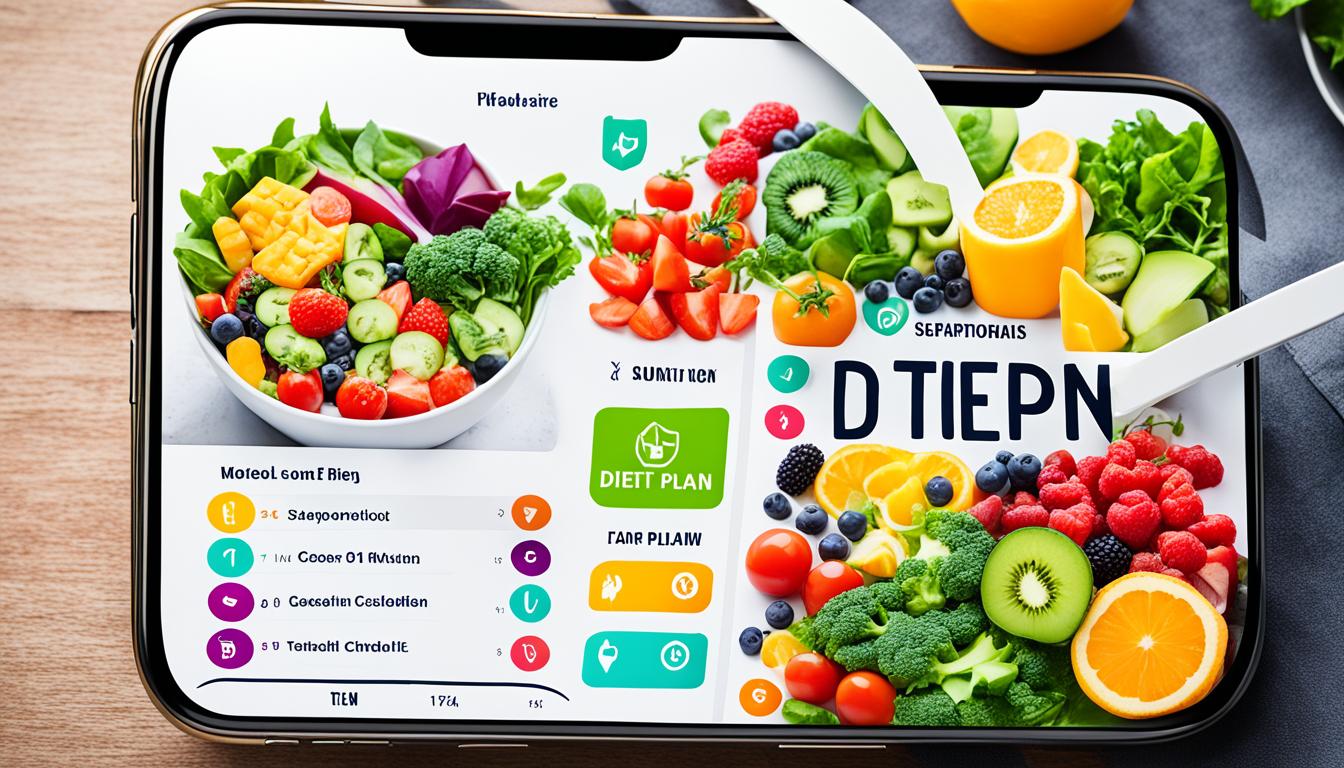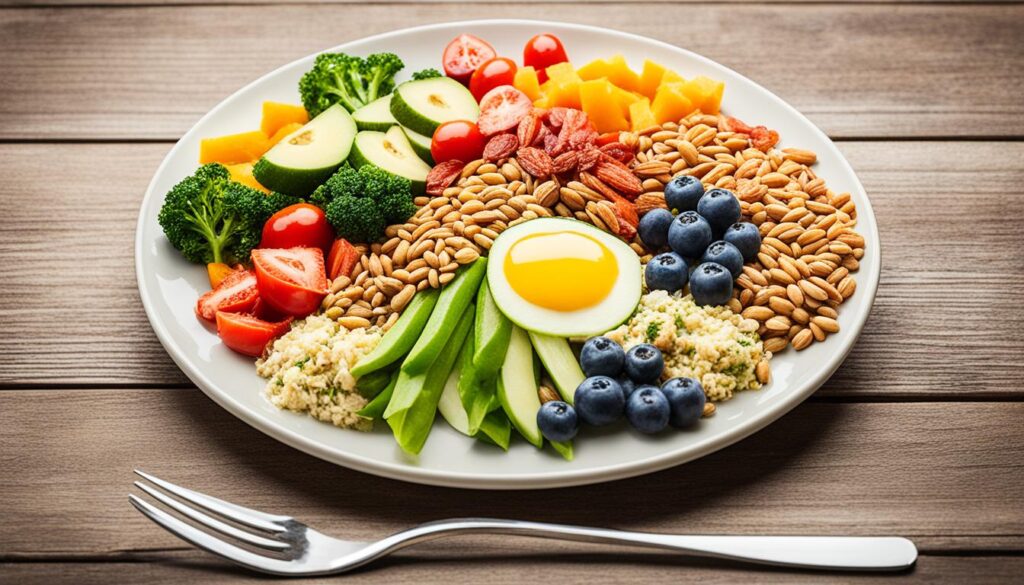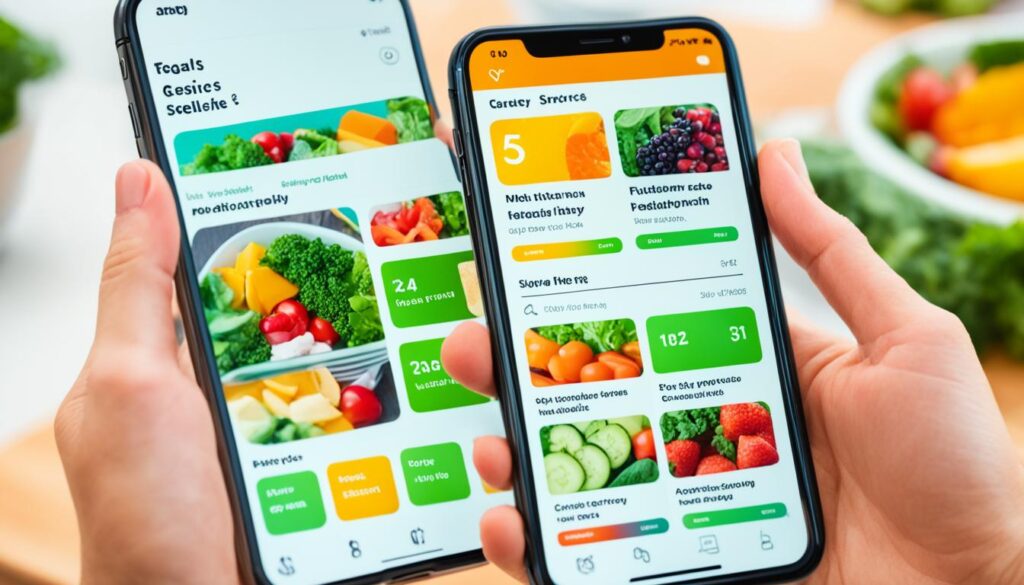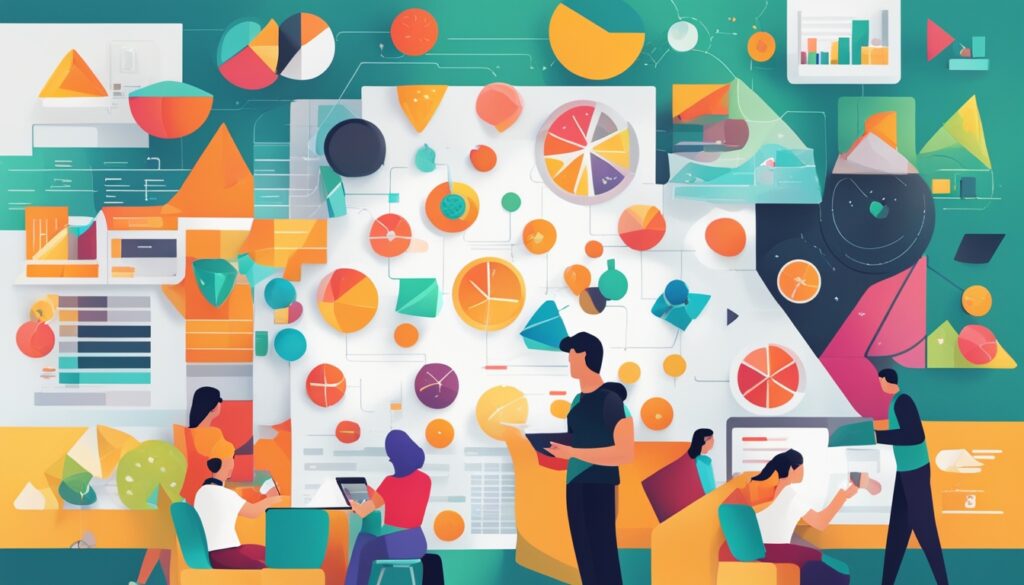Today, personalized nutrition is changing the game, helping people improve their diets and reach health goals. The need for custom diet plans is growing, making personalized nutrition apps key. These apps are made to fit each user’s unique needs, helping them manage their health better.
This article will cover how to make nutrition apps that really help people. We’ll look at how to understand what each user needs, create diet plans just for them, and keep users interested. We’ll also talk about how to handle privacy issues in these apps.
Table of Contents
Key Takeaways
- Personalized nutrition apps offer a tailored approach to diet and wellness, catering to the unique needs of each individual.
- Understanding user data and preferences is crucial for developing personalized diet plans and engaging users.
- Leveraging AI and machine learning can enhance the personalization and effectiveness of nutrition apps.
- Ensuring privacy and security is a top priority in the development of personalized nutrition apps.
- Integrating with wearables and IoT devices can provide a more comprehensive and data-driven approach to personalized nutrition.
The Rise of Personalized Nutrition
More and more people are focusing on their health, leading to a big demand for personalized nutrition. They want diets that fit their specific needs, not just a diet that works for everyone. This shift shows that a one-size-fits-all approach doesn’t always meet everyone’s health goals.
Understanding Individual Dietary Needs
Many things affect what our bodies need from food, like our age, gender, how fast we burn calories, any health conditions, and our lifestyle. For example, a young, active person has different needs than an older, less active person or someone with diabetes. Personalized nutrition plans consider these differences to help us stay healthy.
Limitations of One-Size-Fits-All Diets
Generic diets might be easy, but they don’t meet everyone’s unique needs. This can lead to frustration and health issues. On the other hand, personalized nutrition apps use technology to create diets that fit your specific goals and body type.
| Personalized Nutrition | One-Size-Fits-All Diets |
|---|---|
| Considers individual factors like age, gender, metabolism, and medical conditions | Applies a generic approach, ignoring individual differences |
| Provides customized meal plans and recommendations | Offers a one-size-fits-all solution that may not be effective |
| Leverages technology and data analysis for personalized insights | Lacks the personalization and advanced analytics |
As more people learn about personalized nutrition, they’re looking for diets that fit their unique needs. They’re moving away from generic diets that might not work well for them.
Key Benefits of Personalized Nutrition Apps
Personalized nutrition apps bring many benefits not found in traditional diet plans. They use advanced tech to give users diet plans made just for them. This leads to better health and more people sticking with their goals.
These apps are great because they meet each person’s unique needs and likes. They learn about your health, lifestyle, and food choices. Then, they make meal plans that are tasty and healthy. This makes it easier to stick with the diet and reach your goals.
Personalized nutrition apps also make a big difference in health. They give advice that targets specific health issues, like weight, diabetes, or chronic conditions. This focused approach can lead to better health and lower disease risk.
These apps also keep users motivated and interested. They use fun features and feedback to keep you on track with your health goals. This is key for sticking with healthy habits over time.
| Benefit | Description |
|---|---|
| Tailored Diet Plans | Personalized nutrition apps create customized meal plans based on individual needs and preferences, leading to better adherence and improved health outcomes. |
| Improved Health Outcomes | By addressing specific health concerns, personalized nutrition apps can help users manage conditions such as weight, diabetes, and chronic diseases more effectively. |
| Enhanced User Engagement | Personalized features, gamification, and interactive feedback help to keep users motivated and engaged with their health and dietary goals. |
In conclusion, personalized nutrition apps are a great way for people to get healthier and meet their diet goals. They offer custom advice, lead to better health, and keep users interested. These apps are changing how we think about nutrition and health.
Understanding User Data and Preferences
To make effective personalized nutrition apps, it’s key to understand what users like and need. By looking at health info and eating habits, app makers can make diet plans that fit each person’s life.
Collecting Relevant Health Information
First, apps need to collect lots of user data. This means getting info on personal details, medical history, and health conditions. Knowing someone’s health helps apps give better advice for improving their health.
Analyzing Dietary Habits and Lifestyle
It’s also crucial to look at how users eat and live. Apps track what people eat, their eating times, and what they like to eat. They also look at how active people are and their daily routines. This helps apps give advice on how to eat and live better.
By using lots of user data and health info, personalized nutrition apps can give advice that really fits what users need and like.
Developing Personalized Nutrition Apps
Creating personalized nutrition apps needs a special tech setup. It must handle the complex needs of each user. Choosing the right programming languages and frameworks is key. Adding artificial intelligence (AI) and machine learning is also important for a great app.
Choosing the Right Technology Stack
For a personalized nutrition app, pick tech that’s scalable, secure, and user-friendly. Use React Native or Flutter for making apps for both phones and tablets. Node.js or Python for the back end, and MongoDB or PostgreSQL for storing user info. Adding APIs for services like fitness trackers or food databases can make the app better.
Integrating AI and Machine Learning
AI and machine learning can make the app smarter. They can look at user data, make diet plans, and give personal advice. By using algorithms that learn from what users like, the app can change and adapt for each person.
Building personalized nutrition apps means putting together the latest tech with a focus on the user. By choosing the right tech and using AI and machine learning, developers can make apps that really help users reach their health goals.
| Technology | Description | Benefits |
|---|---|---|
| React Native | A cross-platform framework for building native mobile apps using JavaScript and React | Allows for efficient development of iOS and Android apps with a single codebase, improved user experience, and faster time-to-market |
| Node.js | A JavaScript runtime environment that enables server-side scripting | Provides a scalable and efficient backend for personalized nutrition apps, allowing for seamless integration with databases and APIs |
| MongoDB | A NoSQL database that stores data in flexible, JSON-like documents | Suitable for handling the dynamic and diverse user data associated with personalized nutrition apps, offering high scalability and performance |
| Machine Learning | Algorithms that learn from data and make predictions or decisions without being explicitly programmed | Enables personalized nutrition apps to analyze user data, predict preferences, and generate tailored recommendations for improved user experience and outcomes |
“The key to developing a successful personalized nutrition app lies in the seamless integration of cutting-edge technologies and a user-centric design. By leveraging the power of AI and machine learning, app developers can create a truly adaptive and personalized experience that empowers users to achieve their health and wellness goals.”
Creating Tailored Diet Plans
Creating diet apps means understanding what each user needs and likes. These apps make diet plans that fit the user’s health goals and food likes. They focus on getting the right amount of nutrients and calories for each person.
Nutrient Tracking and Meal Planning
These apps use user info like health details and eating habits. They use smart algorithms to make tailored diet plans. These plans make sure users get the right mix of macronutrients and micronutrients for good health.
The apps track nutrients and suggest meals based on what users need. They offer recipes and meal ideas that fit their dietary recommendations and personalized nutrition needs. This helps users make better choices for their meals and nutrients, leading to a better diet plan.
“Personalized nutrition apps are revolutionizing the way we approach our dietary needs, offering customized solutions that go beyond one-size-fits-all approaches.”
Thanks to technology and data, personalized nutrition apps help people manage their health. They offer tailored diet plans, nutrient tracking, and meal planning that meet each person’s needs.
Engaging and Motivating Users
Keeping users engaged and motivated is key for personalized nutrition apps to succeed. To boost user engagement, apps can use gamification, social features, and personalized coaching and support.
Gamification and Social Features
Gamification makes apps more fun and engaging. It adds things like points, badges, leaderboards, and challenges. These elements make tracking progress and competing with friends rewarding. Users feel great when they hit their dietary goals.
Social features also help build a supportive community. Users can share their progress and connect with others. This makes the app more engaging and supportive.
Personalized Coaching and Support
Adding personalized coaching and support is great for nutrition apps. Features like one-on-one consultations and virtual coaching help users stay on track. They feel empowered to eat healthier.
These strategies make users more likely to stick with the app. They follow dietary advice better and see better health results.
Privacy and Security Considerations
Personalized nutrition apps collect and store lots of user data. It’s crucial to have strong privacy and security. They deal with things like what you eat and your health, so keeping your info safe is key.
Apps need to gain trust by being open and secure. They should use data encryption and keep it safe. Users must know how their info is used and shared.
- Implement end-to-end encryption to protect user data
- Obtain explicit user consent for data collection and usage
- Comply with relevant data protection regulations, such as GDPR and HIPAA
- Regularly audit and update security measures to address emerging threats
- Provide users with clear privacy policies and the ability to manage their data preferences
Putting privacy and security first helps apps gain trust. It keeps your data safe and makes the apps more reliable. This is good for everyone.
“Protecting user privacy should be a fundamental consideration in the development of any personalized nutrition app. Without trust, users will be hesitant to share the data needed to truly personalize their experience.”
| Privacy Measure | Description |
|---|---|
| Data Encryption | Implement end-to-end encryption to protect user data during storage and transmission. |
| User Consent | Obtain explicit user consent for data collection and usage, and provide transparency around data practices. |
| Regulatory Compliance | Ensure compliance with relevant data protection regulations, such as GDPR and HIPAA. |
| Secure Data Storage | Implement robust measures to securely store and manage user data, with strict access controls. |
| Security Audits | Regularly review and update security measures to address emerging threats and vulnerabilities. |
Integration with Wearables and IoT Devices
The mix of personalized nutrition apps with wearable devices and IoT (Internet of Things) tech could change how we get personalized nutrition. These technologies work together to gather lots of data. This data helps make nutrition plans that fit each person better.
Using wearable devices and IoT devices gives us more data on our health. They track our activity, sleep, and other health info. This info, when shared with a personalized nutrition app, helps make diet plans that really suit us.
For instance, a fitness tracker can keep an eye on how many steps you take, your heart rate, and how many calories you burn. A smart scale can track your weight and body shape. This info goes into the personalized nutrition app. It helps make better suggestions on how many calories to eat, what nutrients you need, and how to plan your meals.
| Wearable Device | Tracked Metrics | Benefit for Personalized Nutrition Apps |
|---|---|---|
| Fitness Tracker | Steps, heart rate, calorie expenditure | Helps determine individual’s activity level and calorie needs |
| Smart Scale | Weight, body composition | Enables monitoring of weight and body changes over time |
| Sleep Tracker | Sleep duration, quality, and stages | Provides insights into the impact of sleep on metabolism and overall health |
But, combining these techs has its challenges too. We need to make sure the data works well together and keep it safe and private. People making personalized nutrition apps have to be careful with these issues to offer a reliable solution.
As these technologies get better, personalized nutrition apps will use wearables and IoT devices even more. This will help people take better care of their health and well-being. It could lead to better health and a better life overall.
Developing Personalized Nutrition Apps
Creating a personalized nutrition app is a complex task. It requires understanding both the technical and design sides. Every part of the app must be made with care. This ensures users get a unique and engaging experience.
At the heart of these apps is the ability to collect and analyze user data. This lets the app give personalized diet advice and meal plans. It uses AI and machine learning to process the data. Then, it shows the results in a way that’s easy to understand and nice to look at.
App Architecture and Design Principles
Building a personalized nutrition app needs a strong and flexible design. This means:
- Using secure systems to store user data and health info.
- Creating a backend that can grow with new features and updates.
- Working with other services like fitness trackers and online shops to make the app better.
The design should focus on what the user wants and likes. This means:
- Making the app easy to use and navigate.
- Adding fun elements like progress tracking and rewards.
- Offering personalized advice, learning tools, and community support.
By balancing strong app design with user-focused features, developers can make apps that really help people improve their eating habits.
“Personalized nutrition apps are changing how we manage our diets and health goals. They use new tech to give meal plans and advice that fit each person. This makes healthy living easier and more doable.”
Marketing and Monetization Strategies
The demand for personalized nutrition apps is growing fast. It’s important to have good marketing and monetization plans for their success. By using freemium models and in-app purchases, these apps can make money and keep growing. This helps both the apps and their users.
Freemium Models and In-App Purchases
The freemium model is great for personalized nutrition apps. It lets users try the app for free and then pay for more features. This way, users can see what the app offers and choose to pay for more.
In-app purchases add to the revenue. Users can buy things like special dietary guides, coaching, or premium meal plans. This makes the app a steady source of income.
- Offer a free version with limited features to attract users
- Provide seamless upgrades to premium plans with enhanced personalization and customization
- Introduce in-app purchases for specialized content, coaching, or advanced meal planning
By balancing free and paid features, personalized nutrition apps can make money and keep users happy.
Effective Marketing Tactics
Getting and keeping users for personalized nutrition apps needs a good marketing plan. Using targeted ads, working with influencers, and campaigns to get new users helps a lot. Social media, content marketing, and partnerships can also show off what makes the app special.
- Implement targeted advertising campaigns on relevant platforms
- Collaborate with health and wellness influencers to reach new audiences
- Invest in content marketing to educate and engage potential users
- Explore strategic partnerships with complementary brands or healthcare providers
With a mix of marketing tactics, personalized nutrition apps can draw in, keep, and grow their user base. This leads to their success over time.
Compliance with Regulations and Guidelines
Personalized nutrition apps are becoming more popular in healthcare and wellness. It’s key for developers to make sure their apps follow the rules and guidelines. These apps deal with sensitive data and health claims, so they must meet strict standards.
To keep users’ trust and avoid legal problems, app developers need to know the latest rules. They should understand laws like the GDPR in Europe and HIPAA in the US. These laws cover how to handle and store personal data.
Apps also need to be careful with their health claims. They can’t make promises they can’t back up. Working with health experts and regulatory groups helps ensure the app’s advice is safe and based on science.
Apps must follow rules for nutrition labels and ingredient info too. This lets users know what’s in the food and supplements they’re getting from the app.
| Regulation | Description | Relevant for Personalized Nutrition Apps |
|---|---|---|
| GDPR | The General Data Protection Regulation in the European Union that governs the collection and processing of personal data. | Personalized nutrition apps must ensure they comply with GDPR requirements for data privacy and user consent. |
| HIPAA | The Health Insurance Portability and Accountability Act in the United States that sets standards for the protection of sensitive patient health information. | Personalized nutrition apps that handle health-related data in the US must adhere to HIPAA regulations. |
| Nutrition Labeling | Industry guidelines and regulations for the labeling and disclosure of nutritional information on food and supplements. | Personalized nutrition apps must provide accurate and transparent nutritional information for the recommended meals and supplements. |
By keeping up with new rules, personalized nutrition app developers can keep users’ trust and avoid legal trouble. Following the law is key to making successful and responsible apps in healthcare.
Future Trends and Developments
The personalized nutrition industry is set for big changes in the coming years. We’ll see growth in two main areas: nutrigenomics and artificial intelligence (AI).
Advancements in Nutrigenomics
Nutrigenomics looks at how genes affect our nutritional needs. It will be key in the future of personalized nutrition apps. These apps will get better at giving advice based on your genes, metabolism, and diet needs.
Imagine your app telling you the best diet and supplements for your genes. This could help you reach your health goals more effectively.
The Role of Artificial Intelligence
Artificial intelligence (AI) is changing personalized nutrition now, and it will keep growing. AI can look at lots of data to make meal plans and nutrition advice just for you. It can also give you advice and support through chatbots and virtual assistants.
As personalized nutrition grows, we’ll see more advanced personalized nutrition apps. They’ll use nutrigenomics and artificial intelligence to offer better health solutions.
“The future of personalized nutrition lies in the synergy of cutting-edge technologies and a deep understanding of the individual’s unique genetic and physiological makeup.” – Dr. Jane Doe, Nutritional Scientist
Conclusion
Personalized nutrition apps are changing the way we eat. They use user data and advanced tech to give us custom diet plans. These plans meet our unique needs and tastes, making us healthier and more engaged.
As more people want personalized nutrition, we’re seeing big advances in fields like nutrigenomics and AI. These will make personalized nutrition apps even better. By following the advice in this article, developers and entrepreneurs can make apps that help people reach their diet goals.
Personalized nutrition apps, with their advanced tech and custom features, offer a big chance to meet everyone’s dietary needs. As the industry grows, we’ll see more diet plans made just for us. This will lead to a better way of eating for health and wellness.














